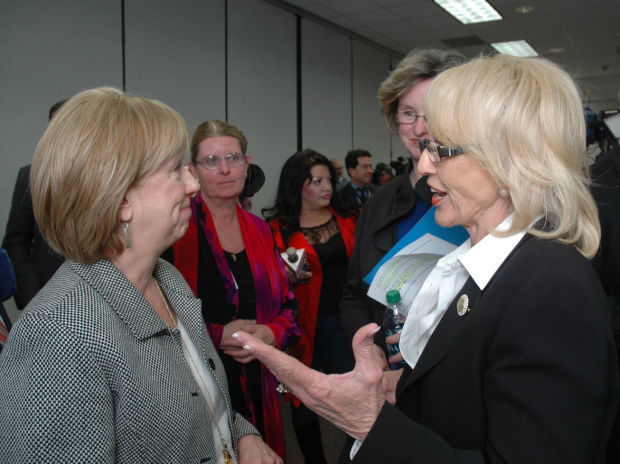Restoring childless adults to the state’s Medicaid program has reduced uncompensated care at Arizona hospitals by nearly a third, new data show.
A report from the Arizona Hospital and Healthcare Association says uncompensated care at hospitals statewide was down by 31 percent in the first four months of this year when compared with the same period in 2013.
During that period, enrollment in the state’s Medicaid program swelled. Enrollment was encouraged communitywide as part of an effort to meet a federal requirement through President Obama’s Affordable Care Act that all Americans, with certain exceptions, have health insurance this year.
The Arizona hospital report shows the average operating margin of Arizona hospitals has gone up from 4 percent in 2013 to the current rate of 5.2 percent — a signal to some health experts that the Affordable Care Act will be a net positive for hospitals’ bottom lines.
“We were hoping people would take advantage of the Medicaid and federal healthcare.gov opportunity, that they would sign up,” said Judy Rich, the chief executive officer of Tucson Medical Center and chair of the Board of Directors for the Arizona Hospital and Healthcare Association.
“We had an active campaign here as a community of hospitals in Tucson, and I’d say we’re guardedly optimistic.”
Nearly one in every four residents in Arizona is now covered by Medicaid, which in Arizona is known as the Arizona Health Care Cost Containment System (AHCCCS).
State data show the number of Pima County residents added to the AHCCCS rolls has jumped 21 percent since last year. The latest numbers show 239,828 Pima County residents are enrolled in AHCCCS. Enrollment is 1.55 million statewide.
Uncompensated care refers to a combination of bad debt from people who don’t pay their hospital bills and charity care to people who are unable to pay.
Arizona hospitals included in the analysis wrote off a total of $246 million of uncompensated care between January and April of 2013. This year, that amount was $170 million, the survey says. The survey included 75 percent of the state’s hospitals.
That drop in bad debt and charity care is directly related to the restoration of childless adults to Arizona’s Medicaid program, said Jim Haynes, chief operating officer for the Arizona Hospital and Healthcare Association.
Uncompensated care at Arizona hospitals began to spike after the childless adult population was frozen out of enrolling in Medicaid in July 2011, he said. Those already in the program were grandfathered in, but by December 2013 the population of childless adults on Medicaid had dwindled to 67,700. Their numbers have since jumped 247 percent, corresponding with a drop in uncompensated care for hospitals.
“July 2011 was like a cliff for us in Arizona. We went into 3½ really difficult years of losing reimbursement for these patients who are now covered,” Rich said.
Officials with both the University of Arizona Health Network and the Carondelet Health Network of Southern Arizona say bad debt and charity care have declined at their hospitals this year, but were not more specific.
The drop at Tucson Medical Center has been significant — about 45 percent, Rich said. She attributes that to a strong push at her hospital to get people enrolled in health insurance.
When the state decided to expand its Medicaid programs last year, hospitals agreed to pay an assessment to help finance the state’s portion of the expansion. Haynes said hospitals statewide have paid $75 million for that assessment so far this year. Rich said Tucson Medical Center is paying about $900,000 per month.
Arizona’s uncompensated care data are similar to those in a recent report from the Colorado Hospital Association that showed charity care at Colorado hospitals dropped an average of 36 percent between 2013 and 2014.
Haynes said while the drop in uncompensated care is good, it’s too early to know whether the assessment might offset the financial gains. Rich believes that hospitals’ bottom lines will benefit overall.
Originally, Medicaid expansion was required as part of the Affordable Care Act. But the U.S. Supreme Court ruled that it should be voluntary and up to individual states.
Arizona Gov. Jan Brewer opted to expand Medicaid in Arizona by raising the income ceiling to 133 percent of the federal poverty level, which works out to an annual income of $31,721 for a family of four. Expanding Medicaid has added another 25,000 people to AHCCCS. Brewer restored childless adults as eligible for coverage at the same time.
The Affordable Care Act created health-care “marketplaces” where eligible individuals and families could buy private health insurance, and depending on income level, get federal subsidies for that insurance. The marketplaces also screened for Medicaid eligibility and directed those who qualified to enroll.
Between Oct. 1 and the end of open enrollment on March 31, 120,071 Arizonans signed up for private health insurance through the marketplace, and most qualified for federal subsidies. Some of the people who bought insurance via the marketplace were previously uninsured, and ideally they will be fueling an improvement in hospital finances, too.
A national report published in the New England Journal of Medicine this week says 20 million Americans have gained health coverage through insurance expansions initiated by the Affordable Care Act, including 6 million on Medicaid and a federal children’s health-insurance program.





